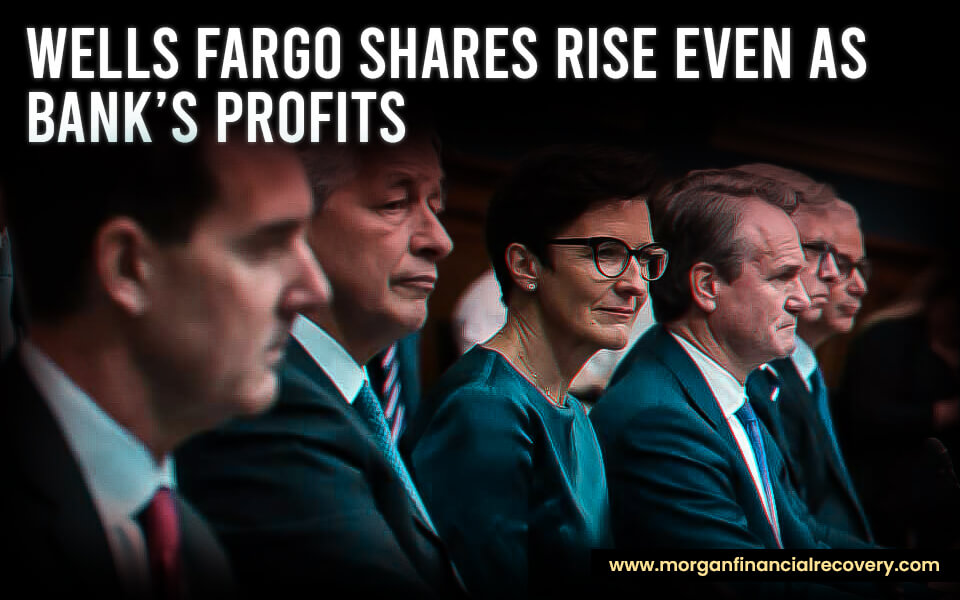
Broker scams involve the dishonest approach of duplicating unusual features of a person, company, or brand. For example, a person impersonates someone else to gain an advantage. This motivation typically involves stealing confidential information or peddling fake goods.
In This Article
- What are Broker Scams?
- What are Common Types of Broker Scams?
- How do Broker Scams work?
- How to Identify Broker Scams?
- How to Avoid Broker Scams?
- What to do if you’ve been the victim of Broker Scams?
- How to Recover your Lost Funds from Broker scams?
- Why is Morgan Financial Recovery a trusted name in Broker Scam Recovery?
- Why Choose Us?
What are Broker Scams?
Broker scams are a type of impersonation scam in which an imposter who requests a bogus payment is used in impersonation fraud schemes. Typically, a perpetrator poses as someone with authority to demand money from another party (e.g., directors, executives and even vendors). The con could start with a call, email, fax, text message, or another communication form. A wire transfer is typically requested to ensure immediate delivery of funds.
What are Common Types of Broker Scams?
Here are a few typical sorts of broker scams that traders typically encounter:
Outright Financial Theft or Conversion:
Outright theft is one of the most egregious and harmful types of forex broker scams. In this kind of broker scam, the broker will purposefully misappropriate or steal money from the victim’s trading account directly or indirectly by taking advantage of their privileged position. It may occur in various ways, although brokers typically conceal their scams by employing cunning strategies. It has been shown that elderly and disabled dealers are particularly vulnerable to falling into this trap. The reason for this is that a plethora of people do not pay attention to their account statements.
Contraband Trading:
Before the broker can carry out a transaction on your account, you must permit them. This approval might, of course, come in two forms.
- You open a discretionary trading account first. It is a form of history that you sign as a contract that allows your broker to carry out specific types of trades on your behalf without needing your consent for each one.
- You can also open a non-discretionary brokerage account. This type of account has legal restrictions that prevent your broker from carrying out any transactions for that deal without your consent.
Material fact misrepresentation or omission:
Your broker has a moral and legal obligation to assess any proposed transactions fairly. Other forms of fraudulent trickery are also classified as broker scams. You have the right to report your broker if they omit any material information or misrepresent trading or investing opportunities.
Insufficient diversification:
In investing, “Never put all your eggs in one basket” is one of the most well-known sayings. According to the proverb, investing in securities calls for a more significant number of specific baskets. The framework of a unique and managed portfolio enables the trader to acquire the ideal potential for a respectable profit or return while also attempting to keep your risk low and acceptable.
A broker’s responsibility is to assist his client in keeping a well-diversified portfolio that reduces risk and exposure. If someone loses money as a result of a broker over-concentrating his funds, they should seek legal counsel right away.
Inappropriate Investment Advice:
Your broker has a professional obligation to carefully investigate and evaluate each trader’s unique circumstances. It is crucial since different traders are suitable for different investing opportunities. Additionally, they must create a compressive risk report for each security that fits a trader’s profile nicely.
Let’s say your broker pressures you to make a bad investment because it’s either too hazardous or confusing. An individual has the legal right to get total compensation for any damages in this scenario.
Keeping a personal conflict of interest a secret:
Consider a scenario where your broker solicits your investment and offers a recommendation. You consent to invest a sizeable sum in the shares because you have faith in the broker. However, you learn all of a sudden that the broker did not disclose to you that he owned a sizable portion of the company in which you planned to invest.
The preceding situation is unlawful. Brokers owe a fiduciary commitment to their clients. By law, brokers must provide their clients with all pertinent information so they can make an informed choice. It is against the law to fail to disclose a relevant conflict of interest.
Front Running of Transactions:
Your broker has a professional obligation to obtain the best price for the order you want to place for a trade. So the last thing your broker must do is to take a better amount for themselves, leaving you to pay the surging charges.
When your broker places his order first to secure a higher price for themselves, this is known as front running. He does this even though he knows you have already requested the order. They place your order after the price has increased, resulting in a higher net worth for you to pay.
Portfolio Management Done Carelessly:
Finally, the situation arises when the broker defrauds their clients out of negligence, costing them significant money. Brokerage companies and brokers market their competence and professional skills to clients to sell trading services. Therefore, brokers must exercise a specific minimum level of skill in carrying out their tasks and duties as licensed and registered specialists.
How do Broker Scams work?
Broker scams begin with fake websites and licenses. To convince people that their websites are legitimate, scammers fabricate licenses and display them prominently on the home page.
After providing their email addresses, users are inundated with communications promising them significant incentives if they make a sizable deposit, passive income by referring friends to the platform, or enormous profits when using automated trading software.
Once customers are persuaded to make deposits to the site, withdrawing your money might be rather tricky. Users would encounter withdrawal problems if they attempted to take their money because they had broken one or more of the contract’s terms and conditions or a dubious agreement that had not yet been fulfilled.
How to Identify Broker Scams?
When in doubt regarding broker scams, it is best and safest to research the firm, the broker’s reputation, and any previous clients you might be able to get in touch with.
With your financial accounts, you can also look into these dishonest brokers’ prior disciplinary proceedings, prospective cold calls, and any other peculiar behaviors they might engage in. Finally, before submitting complaints and requesting compensation, you can explore many valuable avenues if you’re unsure whether you’ve been a victim of such trade fraud.
Phony websites:
Online impostor sites typically use people’s names registered as investment specialists and other publicly accessible business data.
Scammers can use this accurate information to set up fake websites and give them a trustworthy and reliable appearance. After that, scammers call potential customers to persuade them to visit bogus websites. These con artists pretend to be reputable websites to solicit personal information or login passwords from naïve past, present, or potential customers.
Irregular Trading License:
Unlicensed, dishonest brokers prey on unsuspecting buyers by pretending to be consultants for some trustworthy financial institutions.
Financial con artists create fake report copies of a legal broker’s public records and then transmit these documents to investors using the assumed identities of investment industry professionals. The CRDs used come from an unregistered trader in the investing company. The victim’s personal information and a couple of their essential papers are sought after throughout this solicitation encounter, and these items are ultimately removed.
How to Avoid Broker Scams?
A broker scam occurs when a person poses as an agent or representative of a business when they are not. They may offer to sell your property for less than what you purchased for it, or they may try to get you to give them money ahead of time. Contact Morgan Financial Recovery.
The top 7 steps to prevent broker fraud:
Look into the broker’s history with care:
Background data, as well as regulation certifications regarding all the brokers and brokerage businesses, is provided on the official website of the respective broker. One must carefully consider these dates before beginning. Avoid those brokers which are not regulated. Besides, examine the information:
- Concerning the number of grievances lodged against the broker
- Whether the company has ever been penalized or suspended.
- Amount paid by the firm to remedy the concerns.
Finish and check new trading account forms appropriately:
When a trader decides to register a trading account with a brokerage business, they are required to fill out various papers, including those that detail their investing goals, net worth, income, and risk tolerance. These documents thoroughly inform brokers’ decisions regarding whether or not a specific investment is suitable for a trader. In addition, these records will support your legal position if you allege the investment was inappropriate. Accordingly, traders should study these documents vigilantly to ensure that the data presented is accurate.
Immediately review account statements and trade confirmations:
Traders should carefully review their monthly account statements and trade confirmations. Never trust the broker’s account summaries. These confirmations and notifications can be carefully examined to spot brokers engaging in unethical, excessive, or fraudulent trading.
Recognize the true purpose of a “happy” letter:
In case the brokerage firm’s analysis reveals shady account activity, several businesses send their clients a letter known as a “happy letter,” which is commonly regarded as such. This letter intends to let the client learn to contact the branch manager if they have any issues without clarifying that their transaction account may involve dubious broker behavior.
Remember that this letter is intended to warn you that you might have been the victim of a broker’s fraud or misconduct. Contact and notify the branch manager of your risk tolerance and investment objectives. Inquire further if any account activity conflicts with your trading profile. If the manager acknowledges the issue, ask him to make the necessary adjustments to address the issue.
Check for excessive trading or Churning
Brokers typically receive commission payments. As a result, a brokerage business can conduct more deals using a cost structure while still earning more fees. Frequent trading is a terrifying strategy for any trader because it can quickly line a broker’s pockets.
Every broker is responsible under the law to ensure that the trades they recommend are reasonable and complement a more thorough trading strategy. However, it’s essential to remember that if your chosen broker trades in your account solely to increase their profit or fees, they are committing fraud, and you must file a case against them to recover your losses.
Address suspicious behavior right away:
Delays in contacting a branch manager or broker about issues with the account can reduce the likelihood that a claim for broker scam and broker misconduct would be successful. However, if you have doubts about any dubious activity, talk to branch managers and brokers immediately. You can express your worries in writing as well.
Close the account:
Last but not least, if you discover misbehavior from a brokerage firm, proceed to close your trading account. Discover a new broker and heed the advice of Morgan Financial Recovery with a qualified securities fraud attorney.
What to do if you’ve been the victim of Broker Scams?
Most traders lack the skills and information necessary to identify broker fraud or improper behavior on the part of the brokerage company. However, if a person worries about a broker’s deception, there are many actions they can take and many places they can turn for advice or legal assistance.
Investors frequently question whether their online trading platform or brokerage firm has provided sound advice when their investment portfolio valuation plummets or declines.
Misconduct on the part of the broker should not be avoided. Nevertheless, there are several things that traders may do to lessen the possibility of suffering substantial investment losses as a result of dishonest broker behavior or fraud. Approach us for assistance, recover your losses with the aid of Morgan Financial Recovery.
How to Recover your Lost Funds from Broker scams?
Every investment carries risk, so it’s essential to consider your risk tolerance when making financial decisions. Unfortunately, stockbrokers frequently commit broker scams to take advantage of honest people like you. Immediately contact Morgan Financial Recovery if you have been the victim of Broker fraud. For broker fraud, you have the legal right to seek restitution. In addition, Morgan Financial Recovery can review your pertinent financial documents and broker-related grievances.
Why is Morgan Financial Recovery a trusted name in Broker Scam Recovery?
At Morgan Financial Recovery, we assist clients who have lost money as a result of both regulated brokers and broker scams. Our legal experts can help trace monies lost through trades made by regulated brokers and take steps to recover lost funds, hopefully.
Many investors know the danger of bitcoin and other kinds of investing when making trades and investments. As a result, they will probably take additional steps and precautions to protect their money from fraud and hackers. They often do this by routing their transactions through a licensed broker, one of the most popular methods.
A regulated broker is registered with a financial regulator whose operations are often overseen by the local regulator. However, using a licensed broker does not mean your investment is safe.
Why Choose Us?
Morgan Financial Recovery is an investigative recovery organization staffed by industry experts who can analyze cases, gather data and information about abusers, and catch fraudsters. But, we don’t stop there and make sure the scammer returns 100% of the stolen amount to the victim.
Our process:
- Go over your case.
- Collecting pertinent evidence
- Deal with the legal entities
- Speedy processing
- Recover your money
FAQs
Check the broker’s name in the Financial Services Register to make sure they are authorized or registered. The register has information on firms and individuals that are regulated by the FCA.
It is common to encounter a practicing broker who isn’t licensed because there are so many techniques to check brokers. A licensed broker may, however, influence you to make more profitable investments to them or their company than to you as a client. Additionally, they might use the funds in your accounts for their own gain, such as getting margin or shoring up their own accounting records.
Choosing the finest trading platforms, financial institutions, trading strategies, best practices, and safeguarding your accounts and devices are the keys to trading safely. Of course, online trading raises some concerns, but investors and traders may rest in confidence that the brokerage businesses that provide this service employ a very high level of protection.
Yes! Nowadays, a margin call is typically issued electronically via your broker’s website. Your broker may also send you an email or notification advising you of the margin call and the amount you must deposit by a specific deadline. But if you are receiving unsolicited calls from brokers, do not engage with them.
Have you been targeted by Broker scams? You’re not alone! Morgan Financial recovery experts can help you to get your money back. Contact us now!


